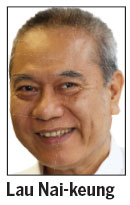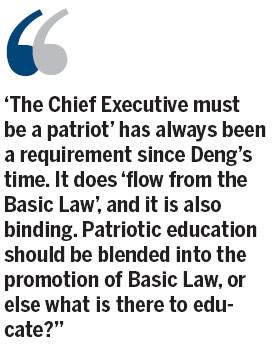Don't over-use Basic Law
Updated: 2013-12-03 07:21
By Lau Nai-keung(HK Edition)
|
|||||||
The Basic Law is now being used as an all-purpose reference, but the weight of meaning that's being heaped on it will only make it looks ridiculous. The Basic Law was never intended to be used as a bible. As I wrote last week, while it is the foundation of our city's present institutional arrangements, the Basic Law is not supposed to dictate every detail about how we conduct our daily business. With or without the Basic Law, the sun will still rise from the East, and we will still need to breathe and eat.
One relevant example illustrating my point is a television commercial promoting the Basic Law sponsored by the Constitutional and Mainland Affairs Bureau. First broadcast last year as part of a series entitled "All these flow from the Basic Law", the "Our Home, Our Country" episode features the conversation of a family with a child named Chung Kwok-yan.
Chung Kwok-yan: Hong Kong is our home. We should protect it.
Sister: Under "One Country, Two Systems", Hong Kong is an integral part of China, our treasured motherland.
Chung Kwok-yan: When I grow up, I'll protect our motherland.
Dad: Great aspirations.

Mother: But we don't need to serve in the army. The central authorities look after Hong Kong's defense.
Sister: How about military expenses?
Dad: Under the Basic Law, Hong Kong has independent finances and need not hand over revenue or pay military expenses.
All: I see! China (mainland) and Hong Kong are one family!
This is what I call creepy propaganda. What gives me goose bumps is not the unnatural "treasured motherland", but that the conversation does not make any sense. Hong Kong does not become an integral part of China under the "One Country, Two Systems" principle as alleged by the Constitutional and Mainland Affairs Bureau through Chung Kwok-yan's sister. In fact, the bureau's message contradicts the Basic Law, which states in its very first line - in the preamble - that "Hong Kong has been part of the territory of China since ancient times."
If this is the only problem with the commercial, we can perhaps call it an oversight. However, if we look at the bureau's message as a whole, it only gets worse.
After Chung mentioned his intention to protect the motherland, his mother swiftly reminded him he doesn't have to join the army. There are, of course, other ways Chung can defend his country, but his parents have not even bothered to touch on them. In fact, they do not seem to care.
Interrupting this "patriotic" narrative, Chung's sister asked the rather awkward question of "who is going to foot the bills". But she is reassured that it doesn't cost Hongkongers a cent.

The whole thing only makes sense under the light of a bargain: Love your country and get a freebie. It is not about rights and responsibilities: The bureau has made sure no responsibilities are even hinted at in the commercial.
In fact, the whole "central authorities looking after Hong Kong's defense" point distorts both history and the central government's message. Before the handover, many Hongkongers did not want the People's Liberation Army stationed here. Deng Xiaoping insisted on the arrangement as a symbol of the nation's sovereignty. Retelling this episode of our history as a goody two-shoes fairy tale in a TV commercial misses Deng's point entirely.
All these blunders occur for a reason: this is what happens when we put patriotic education in the hands of people who lack conviction.
Henry Tang Ying-yen got it right when he told the press that the text of the Basic Law does not spell out a requirement that the Chief Executive has to be patriotic. However, the Basic Law does say the central government has the right to appoint or not appoint an elected Chief Executive. As such, the central government naturally has the right to list its own requirements.
"The Chief Executive must be a patriot" has always been a requirement since Deng's time. It does "flow from the Basic Law", and it is also binding. Patriotic education should be blended into the promotion of Basic Law, or else what is there to educate?
The author is a member of the Commission on Strategic Development.
(HK Edition 12/03/2013 page9)